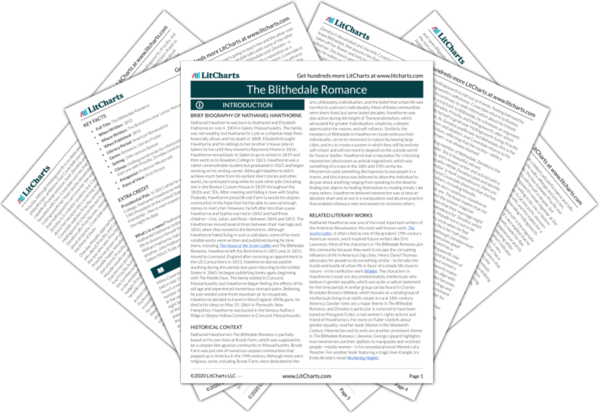Nathaniel Hawthorne’s The Blithedale Romance is full of ambitious dreamers who want to improve their lives. While some of the novel’s characters pursue their ambitions honestly (like Coverdale, who goes to Blithedale hoping to find a better life), others try to use manipulation and dishonesty to achieve their goals. Hollingsworth, for instance, tries to manipulate his friends into helping with his project while letting them think that he’s contributing to the collective, and Westervelt pursues his ambition to get rich by using mesmerism to exploit and control the Veiled Lady. In the end, however, neither Westervelt nor Hollingsworth succeeds in their ambitions; Westervelt loses the act that brought him fame and fortune, while Hollingsworth never establishes his center for criminal reform. By directly tying Westervelt and Hollingsworth’s failures to the consequences of their manipulative behavior, Hawthorne suggests that it’s self-defeating to try to achieve a goal through unethical means.
Hollingsworth is the story’s first example of a master manipulator, a man who plays the part of a devoted, friendly, and helpful community member, but only to achieve his own ends. Coverdale first gets an inkling of this at the beginning of the story when he falls ill and Hollingsworth cares for him with tender devotion. It’s an act that appears kind, but is actually meant to put Coverdale in Hollingsworth’s debt; when he gets better, Hollingsworth questions how Coverdale can really be his friend if he doesn’t help Hollingsworth make Blithedale a criminal reform center. This leaves Coverdale with a “horrible suspicion” that Hollingsworth only took care of him to make him “a proselyte” for a cause he wouldn’t otherwise support.
Hollingsworth likewise pretends to be kind to Zenobia in order to manipulate her into helping him. Zenobia loves Hollingsworth immediately, and he pretends to reciprocate her feelings until she gives him access to her considerable wealth. All Hollingsworth wanted was funding for his criminal reform project, though, and he discards Zenobia like a “broken tool” once he secures her money, cruelly pursuing her half-sister Priscilla instead. This leads Zenobia to tell Hollingsworth who he truly is—a deceptive, manipulative, selfish person—and then kill herself in despair. Notably, despite Hollingsworth getting what he wanted (he marries Priscilla and has access to Zenobia’s money), he never achieves his criminal reform dream. Years later, Hollingsworth tells Coverdale that he hasn’t opened the facility because he’s “been busy with a single murderer,” meaning himself. It was the fallout of Hollingsworth’s manipulative tactics, then, that has prevented him from reaching his most cherished goal, showing how manipulation is a poor strategy for achieving ambitious goals.
Hawthorne shows this same arc of diabolical manipulation leading to dashed ambitions in Westervelt’s character arc. Westervelt, who seems to want wealth and fame, uses mesmerism to manipulate and control Priscilla into being the Veiled Lady in his stage shows. By charging audiences to see her, he exploits her to grow his personal wealth. Testifying to Westervelt’s scary ability to manipulate people, an audience member at one of the Veiled Lady shows says of Westervelt, “Human character [is] but soft wax in his hands.” Furthermore, in the hands of Westervelt, Priscilla says she “never ha[s] any free-will” and therefore can’t choose to disobey him. In addition to this dynamic being obviously abusive and cruel, Westervelt’s strategy to manipulate and exploit Priscilla for money fails. When Hollingsworth realizes that Priscilla is the Veiled Lady, he orders her to come with him, and—accustomed to following orders—Priscilla obeys. She walks offstage, humiliating Westervelt in front of his audience, puncturing the mystique of his act, and leaving him without a performer. Presumably, this is all devastating to his ability to make money, showing how the manipulative aspect of his money-making scheme has directly led him to fail.
The echo between Westervelt’s and Hollingsworth’s failures drives home Hawthorne’s central point; no goal can be achieved by deceiving and manipulating others. However, Hawthorne does not imply that honest ambition succeeds any better. After all, the earnest reformers at Blithedale abandon their project after Zenobia’s death, and Moodie’s sweet plot to connect his daughters backfires when Priscilla runs off with Zenobia’s love. Coverdale even confirms that honest, well-intentioned dreams are doomed to fail: “if the vision have been worth the having,” he says, “it is certain never to be consummated otherwise than by a failure.” But this is not to say that honest and dishonest ambitions are equal. At the very least, the story’s non-manipulative dreamers may have regrets, but they can live with themselves. They know that they’ve failed serving something good, rather than doing something terrible.
Manipulation, Control, and Ambition ThemeTracker

Manipulation, Control, and Ambition Quotes in The Blithedale Romance
The most curious part of the matter was, that, long after my slight delirium had passed away—as long, indeed, as I continued to know this remarkable woman—her daily flower affected my imagination, though more slightly, yet in very much the same way. The reason must have been, that, whether intentionally on her part, or not, this favorite ornament was actually a subtile expression of Zenobia’s character.
How strangely she had been betrayed! Blazoned abroad as a wonder of the world, and performing what were adjudged as miracles—in the faith of many, a seeress and a prophetess—in the harsher judgment of others, a mountebank—she had kept, as I religiously believe, her virgin reserve and sanctity of soul, throughout it all. Within that encircling veil, though an evil hand had flung it over her, there was as deep a seclusion as if this forsaken girl had, all the while, been sitting under the shadow of Eliot’s pulpit, in the Blithedale woods, at the feet of him who now summoned her to the shelter of his arms. And the true heart-throb of a woman’s affection was too powerful for the jugglery that had hitherto environed her.











